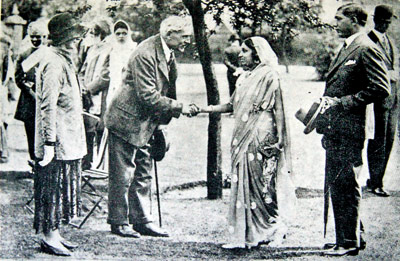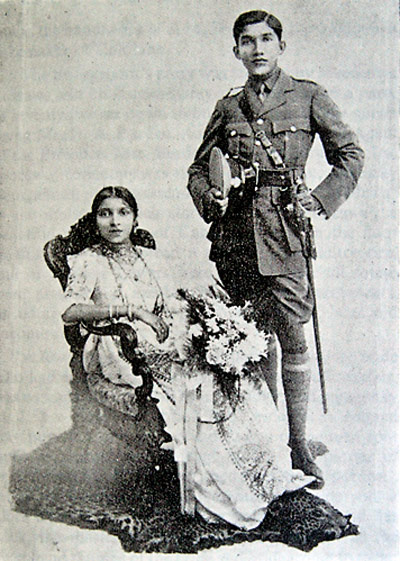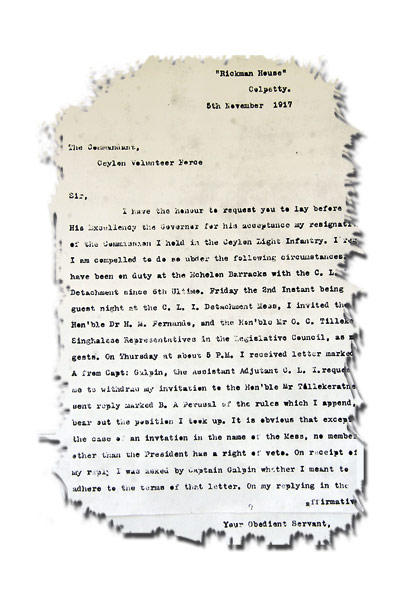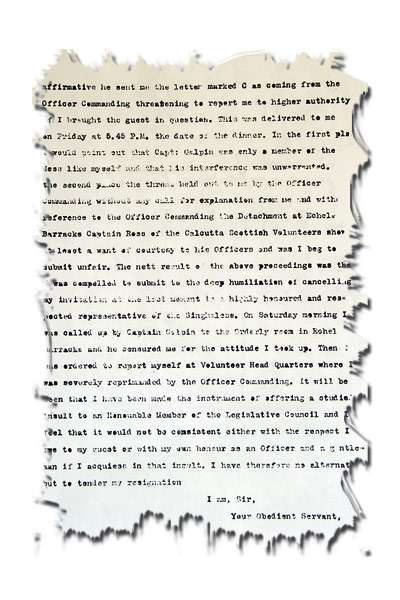D.R. rises to the occasion
View(s):
British Prime Minister Ramsay MacDonald receiving D.R. Wijewardene and Mrs. Wijewardene at the reception given by the British Government to delegates to the Imperial Press Conference (IPC) of 1930 at Hampton Court Palace.
Keble’s biography also touches on D.R. Wijewardene’s aversion to speaking in public and two occasions when he had no choice but to do so. Here are he speeches.
It is difficult to decide whether we in Ceylon fail to preserve of our distinguished men’s letters or whether the white ants eat them all at the back of the family cupboard.
Perhaps the distinguished men never write any and the white ants go hungry. We have only been able to discover two letters written by D.R. Wijewardene and they both relate to a disagreement about a guest of his whom he had invited to the Officers’ Mess of the C.L.I. and they both belong to his subaltern days.
He was entirely in the right as his Colonel’s answer to his letters show, but the letters throw very little light either on the times, or on Wijewardene’s character: they only show a sturdy and some what wrathful indifference on the part of a young subaltern, and trials of Colonels when two young officers disagree. (Please see box for for his resignation letter)
Wijewardene was extremely averse to making speeches which is a quality so rare, that when he was forced to make exceptions to it, his words have an interest which does not perhaps apply to all speeches.
On the 7th July 1930 he was sitting at the table of a formal dinner in London given to the delegates to the Imperial Press Conference. The honour of proposing the health of Lord Derby fell, as the newspapers report, to Mr. D.R. Wijewardene, Chairman of the Associated Newspapers of Ceylon Ltd.
After assiduously avoiding speech-making for many years, he was now in for it, whether he would or not.
“It is my privilege”, he said, “and pleasure, to propose the toast of the Right Hon. The Earl of Derby. If there is one word which is familiar to my countrymen in Ceylon as being typically English, it is the word “Derby”. (Laughter and cheers).
It is, perhaps, true that it is most closely associated with that important day in the English calendar, when the bad luck of the many, and the good luck of the few, is an annual experience which appears to be enjoyed with such gusto at Epsom. (More laughter).
Derby day is a great day in the English calendar, (Hear, hear). Lord Derby is a great name in the list of distinguished living Englishmen. (Loud cheers).
I associate his lordship with that event at Epsom, not only because of a similarity of name, but for another very definite and significant reason. A week or two ago, I witnessed the Derby for the first time in my life.
I realized that it was something more than a race; that it was in fact an occasion when the two great qualities of the British people, sportsmanship and good fellowship, find expression.
These two qualities have consistently adorned the personality of Lord Derby. (Cheers).
When I use the world “sportsmanship”, I do not merely refer to his Lordship’s success on the turf. I am thinking of something of far wider significance.
I refer to what your English have taught the world to understand by the world ‘sportsmanship’ – humanity, sincerity, fair play and a consistent effacement of self in the services of one’s fellows. In the light of that definition I ask you to drink to the health of a great sportsman, a great Englishman and a great administrator.”
On 7th October, 1930, he was again sitting at a dinner table. This time it was the Annual Dinner of the Eastern Newspapers Society. As Managing Director of the Associated Newspapers of Ceylon Ltd., he was the chosen representative of the press of Ceylon at the Annual Dinner of the Society.
When the good health of the press in Ceylon had been duly proposed, Mr. Wijewardene laid down his napkin and got to his feet. “Personally”, he said, “I hate public speaking, but, to a newspaper proprietor the privilege of being asked to reply to something complimentary to newspapers, is such a refreshing experience it seems too good to refuse. (Laughter).
As a representative of Ceylon I feel somewhat apprehensive as to the reception I may get. To judge from the publicity Ceylon has received in the English press of late, I think I may be regarded either as a politician of the most sinister kind or a germ carrier of plague and pestilence. (Laughter).
Some months ago I noticed that Ceylon had been described in an English paper as the Island of Seven Plagues. I cannot remember what these plagues were. I certainly do not intend to ask His Excellency, Sir Edward Stubbs, to prompt me, as he might possibly suggest that the Press of Ceylon was one of them. (Laughter).
But even Sir Edward will admit that there are worse plagues than the press. Even though the newspapers are occasionally known to cause local information in the body politic, they are an effective antidote to more devastating maladies of which public ignorance and prejudice, and the hardening of the heart and also of the head, in both democracies and bureaucracies, are not the least.
It is not unreasonable to believe that the nations of Europe at this moment would be suffering less from hot heads and cold feet, if there had been a free and mere responsible press in some of the countries involved in the International tangle. (Applause).
When we turn to the East we see vast committees emerging into the light of democratic ideals – a light at first dazzling, at times illusive, and often dangerously blinding to politicians, and to the people themselves, unless guided by a free, intelligent and responsible press.
To those who are associated with the press in Eastern countries, it is gratifying indeed to have the encouragement we have had tonight by the presence of so many distinguished guests.
Sir Thomas Catto, as an industrial leader closely in touch with public life, has so well reminded us that sound journalism is still an institution worth working for, particularly in the East, where public opinion, public welfare, as well as trade between individuals, and trade between country and country can be fostered to no small extent by the press. (Applause).
| Why D.R. resigned from the Ceylon Light InfantryD.R. Wijewardene served as an officer in the Ceylon Light Infantry (CLI) as a young man and resigned his commission over a disagreement arising from an invitation he had issued to two Representatives of the Legislative Council to the Officers’ Mess. Published here is the resignation letter he wrote to the Commandant, Ceylon Volunteer Force. Rickman House, The Commandant Sir, I received letter marked A from Capt. Galpin, the Assistant Adjutant C.L.I. requesting me to withdraw my invitation to the Hon’ble Mr. Tillekeratne and sent reply marked B. A Perusal of the rules which I append, bear out the position I took up. It is obvious that except in the case of an invitation in the name of the Mess, no member other than the President has a right of veto. On receipt of my reply I was asked by Captain Galpin whether I meant to adhere to the terms of that letter. On my replying in the affirmative he sent me the letter marked C as coming from the Officer Commanding threatening to report me to higher authority if I brought the guest in question. This was delivered to me on Friday at 5.45 P.M. the date of the dinner. In the first place I would point out that Capt. Galpin was only a member of the Mess like myself and that his interference was unwarranted. In the second place the threat held out to me by the Officer Commanding without any call for explanation from me and without reference to the Officer Commanding the Detachment at Echelon Barracks Captain Ross of the Calcutta Scottish Volunteers showed at least a want of courtesy to his Officers and was I beg to submit unfair. The nett result of the above proceedings was that I was compelled to submit to the deep humiliation of cancelling my invitation at the last moment to a highly honoured and respected representative of the Singhalese. On Saturday morning I was called up by Captain Galpin to the Orderly room in Echelon Barracks and he censured me for the attitude I took up. Then I was ordered to report myself at Volunteer Head Quarters where I was severely reprimanded by the Officer Commanding. It will be seen that I have been made an instrument of offering a studied insult to an Honourable Member of the Legislative Council and I feel that it would not be consistent either with the respect I owe to my guest or with my own honour as an Officer and a gentleman if I acquiesce in that insult. I have therefore no alternative but to tender my resignation. I am, Sir  D.R. Wijewardene (in CLI uniform) and his bride on their wedding day
|




